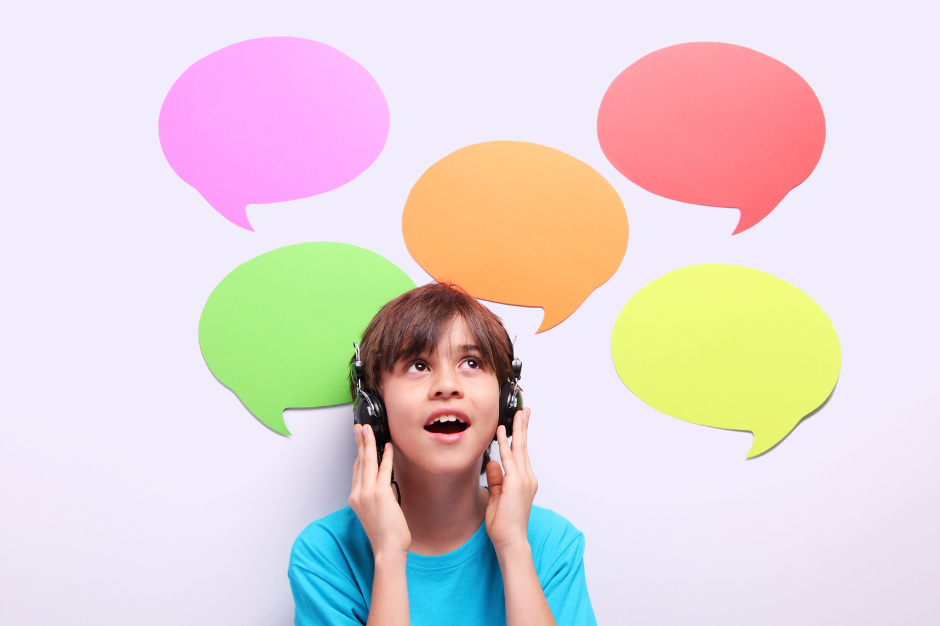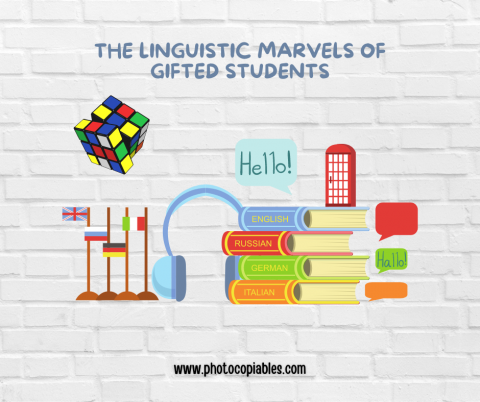Gifted students have always captivated the interest of researchers and educators alike, thanks to their extraordinary abilities across various domains. While their intellectual brilliance has been well-documented, this blog post aims to shed light on a fascinating aspect of their remarkable talents: their distinctive linguistic abilities. By delving into the captivating realm of language, we will uncover the unique linguistic characteristics that set gifted students apart from their peers. This exploration represents the culmination of an extensive research endeavour, seeking to unravel the complex intricacies of gifted students' linguistic aptitude.
Before delving into the research findings, I would like to share my personal observations of working with gifted students who demonstrate exceptional language capabilities. The students I currently work with are around 10 to 12 years old. When I compare them to their peers or gifted students who do not exhibit noteworthy language abilities, I've noticed two striking things: their fluency in speaking and their accelerated language learning ability.
First and foremost, their exceptional speaking skills stand out. They speak fluently, a proficiency primarily developed through frequent exposure to and acquisition of new language chunks. In conversations with these gifted students about their English language development, they shared that YouTube videos are their go-to resource. It's truly surprising to learn that they primarily learn from videos, but their claims are supported by their parents as well.
The second notable aspect is their accelerated learning pace and ability to demonstrate substantial language development within a relatively short timeframe. It's crucial to clarify that I'm not referring to merely achieving better grades in language classes after the first exams. As we know, exam scores may not accurately reflect a student's true academic performance. Most students engage in last-minute cramming the night before their exams, memorizing language material covered in the lessons, and regurgitating it without truly internalizing it. However, I'm specifically referring to a profound transformation in their language abilities and their capability to showcase it. While it's challenging to determine the exact duration for this change, it certainly doesn't happen overnight or in a matter of days or weeks. It's genuinely remarkable to witness the noteworthy transformation in their language abilities by the end of my classes, a change that often goes unnoticed among their peers.
Now, let's delve into a more detailed exploration of the linguistic abilities displayed by gifted students.
Enhanced Vocabulary Acquisition
Gifted students possess an astonishing capacity for vocabulary acquisition. They exhibit an innate curiosity and an insatiable hunger for knowledge, which drives them to explore a vast array of subjects. This unquenchable thirst for learning results in a rich and diverse vocabulary that surpasses their age or grade level. These budding wordsmiths effortlessly grasp complex terms, idiomatic expressions, and subtle nuances of meaning, enabling them to articulate their thoughts with remarkable precision and depth. Numerous studies have shown that gifted students have larger vocabularies than their peers and can learn new words more swiftly and effectively (Nation, 2006). Factors such as exposure to diverse sources of information, motivation to acquire new words, and memory strategies contribute to their vocabulary acquisition.
Advanced Language Processing and Comprehension
Gifted students demonstrate an exceptional ability to process and comprehend language at an accelerated pace. Their quick thinking and cognitive agility enable them to swiftly analyze and interpret complex linguistic structures. Whether deciphering intricate sentence constructions or grasping abstract concepts embedded within texts, their heightened linguistic cognition allows for an unparalleled comprehension of language that surpasses their chronological age. For instance, gifted students can easily comprehend texts involving poetic devices like metaphors, similes, or personification, as well as texts exploring philosophical concepts such as ethics, logic, or metaphysics. They can infer meanings from context clues or background knowledge and establish connections between different texts or ideas.
Eloquence and Expressiveness
Gifted students possess remarkable eloquence and expressiveness that captivate their audience. Their well-developed linguistic skills, combined with innate creativity, enable them to articulate their thoughts with eloquence and flair. They have a natural command of rhetoric, employing persuasive language, vivid imagery, and sophisticated rhetorical devices to effectively convey their ideas. This proficiency in verbal expression empowers them to engage in meaningful discourse and communicate complex ideas beyond their years. For instance, gifted students can employ persuasive language to convince others of their opinions or arguments, utilizing facts, statistics, or testimonials. They can also employ vivid imagery to create sensory impressions or evoke emotional responses in their listeners or readers, incorporating descriptive adjectives, adverbs, or figurative language. Furthermore, they can employ sophisticated rhetorical devices to enhance their expression or style, utilizing techniques such as parallelism, repetition, or irony.
Metalinguistic Awareness
One of the distinguishing features of gifted students is their heightened metalinguistic awareness. They possess an acute understanding of language structures, grammar rules, and stylistic elements. This awareness enables them to analyze and manipulate language with finesse, effortlessly discerning subtle nuances of meaning and purposefully employing them. Their metalinguistic prowess not only enhances their own communication but also lays the foundation for their aptitude in foreign languages, creative writing, and other language-related domains.
Multilingual Proficiency
 Gifted students often display a natural inclination to acquire multiple languages with remarkable ease. Their cognitive flexibility and a keen interest in linguistic exploration equip them with the ability to navigate diverse linguistic systems. Whether through formal instruction or self-guided exploration, they demonstrate an aptitude for mastering languages beyond their native tongue. This multilingual proficiency not only broadens their cultural horizons but also enhances their cross-cultural communication and appreciation.
Gifted students often display a natural inclination to acquire multiple languages with remarkable ease. Their cognitive flexibility and a keen interest in linguistic exploration equip them with the ability to navigate diverse linguistic systems. Whether through formal instruction or self-guided exploration, they demonstrate an aptitude for mastering languages beyond their native tongue. This multilingual proficiency not only broadens their cultural horizons but also enhances their cross-cultural communication and appreciation.
In addition to the aforementioned linguistic abilities, gifted students frequently exhibit other remarkable characteristics. For example, they often display a strong interest in the origins of language and how it functions. Some even pursue advanced studies in linguistic disciplines. (Currently, we have a high school student who is accepted as a visiting student to a prestigious university to attend lessons in the Latin language department.) Moreover, they may excel in using language for creative purposes, such as writing poetry or fiction. Additionally, gifted students often possess a keen ear for language, readily picking up on nuances of meaning and tone.
These linguistic characteristics can significantly impact the lives of gifted students. Their strong vocabulary and comprehension skills provide them with a head start in school, while their critical thinking abilities help them become effective communicators. Moreover, their creativity and sensitivity to language make them valuable contributors to the arts and humanities.
It is important to note that not all gifted students will exhibit all of the linguistic characteristics discussed above. However, these characteristics are more prevalent among gifted students than in the general population. If you suspect that your child may be gifted, it is crucial to communicate with their teacher or a school psychologist. They can assist you in assessing your child's abilities and developing a plan to support their linguistic development.
By understanding the linguistic abilities of gifted students, we can better support their educational and personal growth. By providing them with opportunities to utilize their language skills in various ways, we can help them reach their full potential and make a positive impact on the world.
The distinctive linguistic talents exhibited by gifted students serve as a testament to their exceptional cognitive and linguistic aptitude. Their insatiable curiosity, advanced language processing, eloquence, metalinguistic awareness, and multilingual proficiency collectively contribute to their linguistic prowess. By recognizing and nurturing these unique abilities, educators can tailor instructional approaches to cater to the specific needs of gifted students. Through understanding and harnessing their linguistic talents, we can empower gifted students to achieve their full potential and make significant contributions to the ever-evolving landscape of language and communication.
This blog post is co-created with an LLM chatbot.






